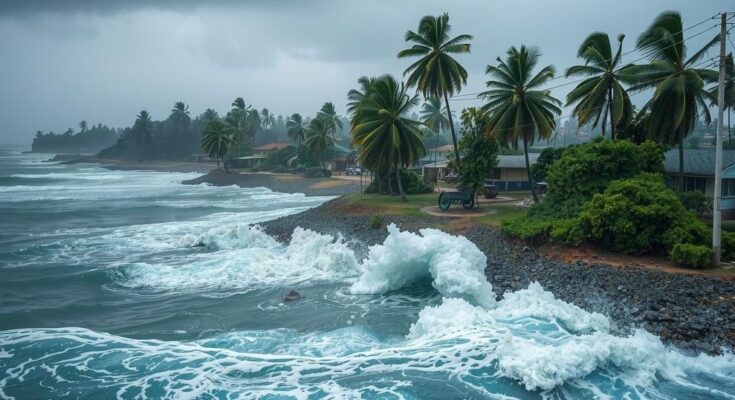Cyclone Chido has resulted in 94 deaths and 768 injuries in Mozambique, significantly impacting over 622,000 individuals. The cyclone caused extensive damage to educational and health facilities, with ongoing government mobilization efforts for recovery. The event emphasizes the broader issues of climate change and vulnerability in affected regions.
Cyclone Chido has tragically claimed the lives of 94 individuals in Mozambique since making landfall last week, according to local authorities. The National Institute of Risk and Disaster Management (INGD) reported 768 injuries and more than 622,000 people impacted by the cyclone. The storm, which struck on December 15, featured winds reaching 260 km/h (160 mph) and delivered 250 mm of rainfall within the first 24 hours.
Originally manifesting its force in the French Indian Ocean territory of Mayotte, Chido then progressed through Mozambique, Malawi, and Zimbabwe, causing significant damage. In Mozambique, it primarily affected the northern provinces of Cabo Delgado, Niassa, and Nampula, which are prone to such natural disasters. The INGD noted severe impacts on the education and health sectors, where over 109,793 students were affected and numerous school facilities sustained extensive damage, alongside 52 disrupted sanitary units, compromising health service access under already strained conditions.
Daniel Chapo, a leader of Mozambique’s ruling party, confirmed to media outlets that the government is actively mobilizing aid efforts “on all levels” in response to the disaster. During his visit to Cabo Delgado, he emphasized collaborative efforts with the INGD to aid recovery in the affected regions of Mecúfi, Nampula, Memba, and Niassa.
In Mayotte, where Cyclone Chido was deemed the worst storm in 90 years, the death toll currently stands at 35 according to the interior ministry, with predictions suggesting potential increases as damage assessments continue. Local officials emphasized the likelihood of multiple casualties, indicating that the total number may reach into the hundreds or possibly thousands. Support operations have deployed over 1,300 officers, and efforts to restore basic necessities for residents are ongoing, amid gradually returning running water and the distribution of essential supplies.
The repercussions of Cyclone Chido spotlight the impact of climate change on social infrastructure. According to the INGD, the cyclone underscores the necessity for resilient planning to mitigate future disaster effects. While assessing climate change’s direct role in individual cyclone events proves complex, evidence indicates that rising temperatures influence the intensity and precipitation levels of tropical cyclones. The Intergovernmental Panel on Climate Change (IPCC) has indicated “high confidence” that human activity has contributed to increased precipitation linked to tropical cyclones and a “medium confidence” regarding the intensification of such storms.
The increasing frequency and intensity of tropical cyclones are increasingly attributed to climate change. As global temperatures rise, meteorologists and climate experts observe correlations between enhanced precipitation rates and the severity of cyclone impacts. This phenomenon has significant implications, particularly for vulnerable regions like Mozambique, which frequently experience severe weather events. Understanding these connections is crucial for developing effective disaster preparedness and response strategies in countries affected by climate change.
Cyclone Chido has had devastating effects in Mozambique, with significant loss of life and considerable disruption to essential services such as education and healthcare. The collaborative government response aims to assist affected communities in rebuilding and recovery. Moreover, the cyclone serves as a stark reminder of the ongoing threat posed by climate change, highlighting the urgent need for resilient planning and proactive measures to safeguard vulnerable populations against future disasters.
Original Source: www.bbc.com




